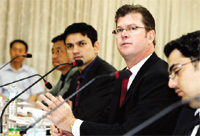All current laws and regulations related to FDI have been streamlined and incorporated into a single legal framework represented by the new Foreign Investment Promotion Act (FIPA), which took effect in November 1998. This will enable foreign investors to take advantage of one-stop service and uniform treatment.

To Attract More FDI: South Korea is creating a business-friendly environment for foreign investors.
Various incentives, including tax exemptions and reductions, have been instituted to promote FDI. To cite an example, corporate and income taxes will be exempted or reduced for high-tech businesses for a period of seven years. Government-owned real estate will be leased to foreign-invested firms for up to 50 years at favorable rates, and for no cost in certain instances. Also, a Free Investment Zone will be developed to accommodate large-scale FDI. The Government continues to phase out import restrictions, reducing the number of items subject to tariffs.
Service Sector: Liberalization of Korea's service sector has been difficult due to the relatively underdeveloped state of domestic service industries. Nevertheless, the Government has taken a number of unilateral actions toward its eventual full opening. To cite some examples, the life insurance industry is now completely open to foreign underwriters.
Foreign banks receive treatment commensurate to that of national banks. Investment by foreigners in retailing and wholesaling activities is also open, although certain restrictions exist in specific areas. The advertising market, once open only to joint ventures with minority foreign participation, is now completely accessible to foreigners.
Intellectual Property Rights: The Government recognizes that the strict protection of intellectual property rights is essential for the technological well-being of the nation and for cooperative economic relations with major trading partners. Consequently, since 1987, the Government has instituted fundamental reforms to strengthen the protection of intellectual property rights.
New copyright laws ensure comprehensive protection for both foreign and domestic works. Copyright guarantees extend over the life of an author plus 50 years. Also, safeguards against intellectual property infringement have been extended to computer software products through specific legislation.
Agricultural Market: In Korea, as in many countries, agricultural policy is fraught with far-reaching social and political implications, making liberalization of this sector a daunting challenge.
Korean sensitivity about agriculture derives in part from the fact that arable land per farmer in Korea is only 1/57 that of the United States, which makes it impossible for Korean farmers to be as competitive as their U.S. counterparts. Nonetheless, the Korean Government is making efforts to further open the domestic agricultural market. These efforts are accompanied by continuing government initiatives to strengthen the competitiveness of Korea's agricultural sector.
In December 1988, the Government formed a task force to revise the schedules for agricultural import liberalization through 1991. Revised plans have helped to increase the scope of liberalization and accelerate the pace of market opening. Also, during the Uruguay Round of the GATT (General Agreement on Tariffs & Trade) negotiations on agricultural products, Korea committed to improving market access for various agricultural products.